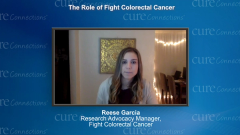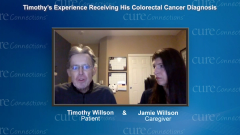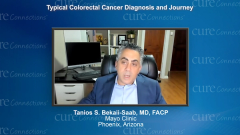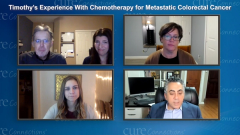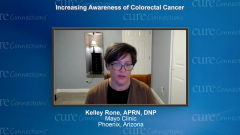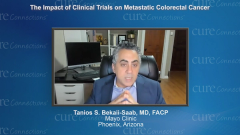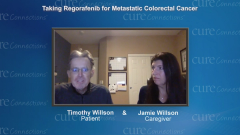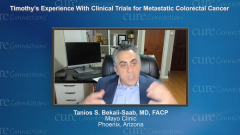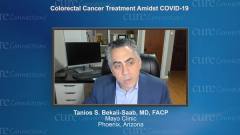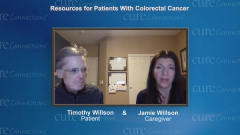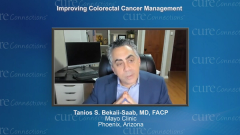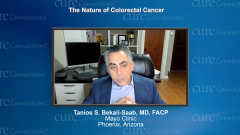
Timothy’s Experience With Chemotherapy for Metastatic Colorectal Cancer
Episodes in this series

Tanios S. Bekaii-Saab, MD, FACP: Tim, we have talked about your treatment. We will go back to talk a bit more about clinical trials because, as Reese mentioned, we all know clinical trials are—when available—the backbone of how we advance care, because we are not where we want to be yet. We are doing much better. Certainly, a lot of it came at the heels of a lot of research over the years, but we want to continue doing better.
We talked a bit about the radiation and the cetuximab. What was your experience on chemotherapy and some of the adverse effects? You say you did well, and I know you are pretty tough. I sometimeshave to sit with you, and I have to drill you for you to tell me about the issues that are happening, and I can understand why. Sometimes feeling disabled by a treatment or limited at a time of your life when you did not expect this to be the way you would live is understood. Perhaps it is important, in this forum at least, to describe what happened during those treatments and what it felt like to disrupt your life. Jamie, I will get back to you after this. How did it feel with these effects—a couple of days, three days a week? How did life go for Tim?
Timothy Willson: I went into it with a little trepidation because the word chemotherapy frightens most people, including me. I went into it, and I went to a seminar that the Mayo [Clinic] had put on about first-time people with chemotherapy, which was good and answered some questions that I had. It changes your daily routine a lot, and you have to be prepared. Jamie helped me a lot with this. After you get home, you are not going to go out and cut trees down in the back yard. You may have to rest for a day or two and recover. We got into a good groove where I would get the chemotherapy, and I would feel bad and run down the next day, particularly with the FOLFOX-6 [5-fluorouracil, leucovorin calcium, oxaliplatin] regimen. Initially I could not touch anything that was cold, and your hands feel like they are going to fall off.
The first chemotherapy was a learning experience, and I had the support from my doctor, who said to keep exercising and keep trying to do my normal routine as I could when I felt the energy to do it. I kept working out every day. I switched from running to walking briskly on the treadmill. I tried to keep things as normal as I could, but it was definitely a life-changing event. I thought, “Wow, where did that come from?” You felt like you got hit by a 300-pound person out on the ice. You have to change your daily routine, especially after the treatments. With all the pre- and post-treatments, it is something I got through with not a lot of problems. I continue to be active, and that may have helped as I look back.
Tanios S. Bekaii-Saab, MD, FACP: To remind people, you have been at this for a while. How many years have you been on treatment?
Timothy Willson: April 2012 was my diagnosis.
Tanios S. Bekaii-Saab, MD, FACP: That is about eight years, or it is actually a bit more now.
Timothy Willson: Yeah.
Tanios S. Bekaii-Saab, MD, FACP: We’re in 2021. I keep on forgetting that.
Timothy Willson: Yeah, it will be nine years in April.
Tanios S. Bekaii-Saab, MD, FACP: Yeah, and you are still going strong. It has certainly taken a toll, I understand. Jamie, share your experience. It is important from the caregiver standpoint, and you have been at this for many years. How are you able to support Tim? You have your own thing going as well, so you are managing quite a bit. What would you recommend for other patients and caregivers going through the same process?
Jamie Willson: It is a lot. I want to be there for Tim and take care of him. We have a young son that I also need to take care of, and I have to work so that we have insurance and everything else that we need. It is a lot to manage. Trying to take it one day at a time is the best advice I have. It can be overwhelming when you think of all the different pieces and things there are to manage, so take it one day at a time and try to understand what the patient needs. Tim has needed different things and different levels of support at different stages of his journey and the treatment process. Understanding what he needs at that point in time shifts and changes along his process and his journey. That is probably the most important thing. Trying not to get overwhelmed with everything is probably the best advice I have.
Tanios S. Bekaii-Saab, MD, FACP: Of course, having relatively young children when you are dealing with this—they have grown up with this, right? This is ongoing for eight to nine years. How have your children gone through this process, with the support and acceptance, and the ups and downs? How have you been able to handle this roller coaster of treatments through the last nine years?
Timothy Willson: Can I answer that?
Jamie Willson: Sure.
Timothy Willson: Yeah, that was always exactly what you said. When I was first diagnosed, he was 3 years old, so he did not understand what was going on, and we tried to shield him from a lot of the things that were going on. I tried not to show if I was in pain, why I was sleeping in the middle of the day, and those kinds of things. As he has gotten older, we brought him into the loop more and explained to him—and Jamie did a good job with that—what was going on. He has a pretty good surface-level knowledge of what is happening. We live in the moment, and that seems to help a lot. We do not look too far ahead and do not look back.
Tanios S. Bekaii-Saab, MD, FACP: He was 3 years old when you were diagnosed?
Timothy Willson: Yeah.
Tanios S. Bekaii-Saab, MD, FACP: He is about 12 years old now.
Jamie Willson: 11.
Timothy Willson: Yeah, he is 11.
Tanios S. Bekaii-Saab, MD, FACP: 11 going into 12.
Jamie Willson: He was 2½ years old.
Tanios S. Bekaii-Saab, MD, FACP: I am thinking about not just when you were initially diagnosed but when you were diagnosed with metastatic cancer. You are now thinking about this. I am assuming that he was about 4 or 4½ years old at the time. What was going on in your mind, thinking about that idea of, “Wow, I never thought this would happen”?
Timothy Willson: That is the game changer. It is more serious, and that is why we tried to bring him into the picture more, so he could understand things. It was not too heavy that it would affect him in school and that he would worry about me. I want him to focus on what he is doing because he is an unbelievable kid and a great student. Everything is going great for him, so we try to balance that out with what is happening and keeping things as normal as possible.
Tanios S. Bekaii-Saab, MD, FACP: I know quite a bit, and I hear this from a lot of patients about how the first thing they hear from physicians, nononcologists, is that, “Well, you may have six months to a year to live” and a lot of the nihilism that goes around cancer. I always try to discourage even my oncology colleagues, within reason, to mention numbers, because as you know from your experience, those averages mean little for the individual. It is not that what you are going through is not real; it is very real with the anxieties of understanding that, at some point, this may not continue, but at the same time, there are many more years, we are hoping, that we will continue to see your child grow.
Timothy Willson: Yeah, that has helped more than anything. That is one of the reasons I do not look at the internet and all the statistics and things like that, because it is an individual response to different medications or whatever. Keep focused on what is next, and that is where Kelley has helped a lot with bouncing things off her: “What about this one, and what about this trial?” It definitely keeps you focused on what we can do to be positive. Let’s not think about how I should have been in worse shape than I am now, going on almost nine years. That is an important way to go.
Tanios S. Bekaii-Saab, MD, FACP: There is more to come. We are not close to anything, but we are doing better.
Transcript Edited for Clarity

